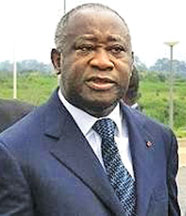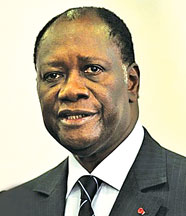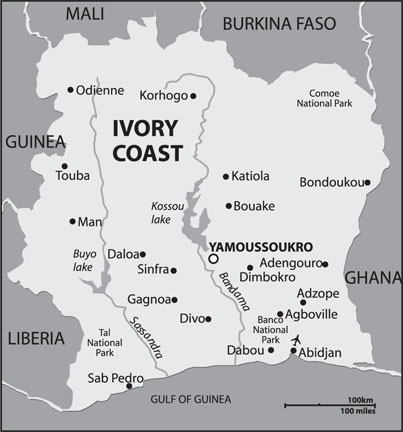|
Ivory Coast:
Post election stalemate continues
Colonial legacies and neocolonial strategies threaten
African unity:
Jayatilleke DE SILVA
 |
 |
| Laurent
Gbagbo |
Alassane
Ouattara |
Seven weeks have passed since the Presidential election in Ivory
Coast on November 28, 2010. The Election Commission declared the
Opposition candidate Alassane Ouattara the winner. He was sworn in as
President. But President Laurent Gbagbo hangs on to power on a decision
of the Constitutional Council which declared the results in certain
Northern districts as flawed. Thus there are two Presidents laying claim
to office.
While Obagbo holds power, still his rival Ouattara is holed up in the
Gulf Hotel in the Capital Abidjan with security being provided by the
United Nations Peacekeeping Forces.
Armed Force
The African Union (AU), the Economic Community of West African States
(ECOWAS), the European Union (EU), the United States (US) and the United
Nations (UN) have recognized Ouattara as President. They have called
upon Gbagbo to relinquish power. Yet he remains defiant.
The AU sent several missions to Ivory Coast in an effort at
mediation. Its most recent mission has been entrusted to the Kenyan
Prime Minister Raila Odinga. So far the mission has not succeeded. This
brings near intervention by a multinational Armed Force of the AU on
behalf of Ouattara.
Though the AU decided unanimously to intervene militarily if needed,
Nigeria has subsequently taken a stand against such intervention. Thus
the monolithic unity displayed by the AU stands breached.
West African country
Ivory Coast is a West African country with a population equal to that
of Sri Lanka and a territory that is five times that of Sri Lanka. It is
bordered in the East by Ghana, in the West by Guinea and Liberia, in the
North by Burkina Faso and in the South by the Gulf of Guinea.
 It is rich in natural resources. It is the world’s largest exporter
of cocoa beans. Its other exports include petroleum, natural gas, cocoa
and palm oil. Its wealth also includes diamonds, manganese, cobalt,
gold, iron ore, bauxite, copper, silica sand and hydrel power. It is rich in natural resources. It is the world’s largest exporter
of cocoa beans. Its other exports include petroleum, natural gas, cocoa
and palm oil. Its wealth also includes diamonds, manganese, cobalt,
gold, iron ore, bauxite, copper, silica sand and hydrel power.
Politically Ivory Coast is polarized between the largely Muslim North
and the largely Christian South. Though the civil war that engulfed the
country in 2002-3 has ended the current crisis is pregnant with the
possibility of a fresh civil war breaking out and even spreading beyond
its borders.
Colonial powers
The African continent has been burdened with both Inter-state and
intra-state conflicts that developed into wars throughout its post
independence history.
Such conflicts could be very often attributed to two reasons. First
is the indiscriminate division of the continent into new States by
colonial powers without considering the physical, sociological and
cultural diversities and uniformities.
The second is the need for them to own or exploit the continents vast
natural resources.
Currently it is the neocolonial strategies that still perpetuate
these conflicts and wars.
|



